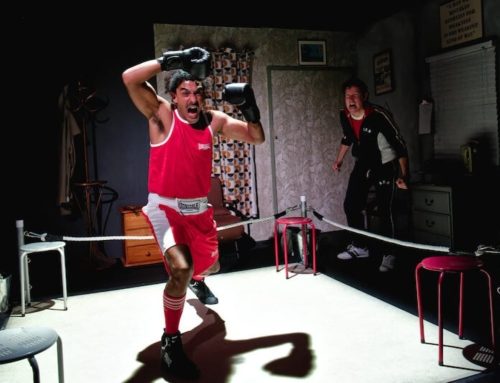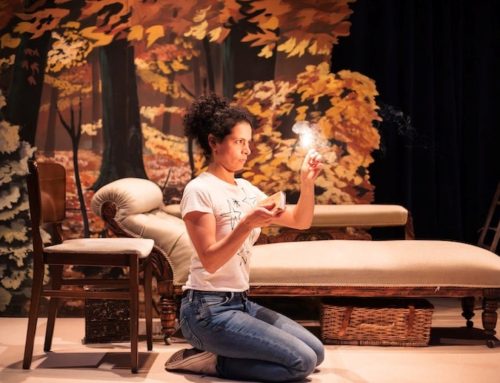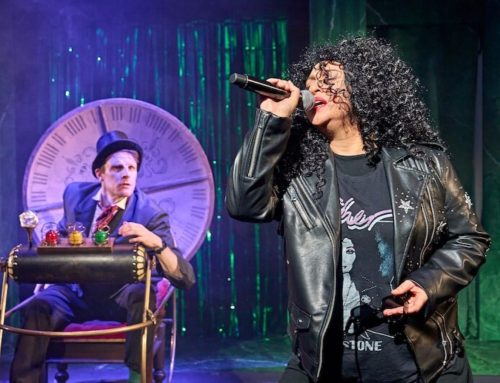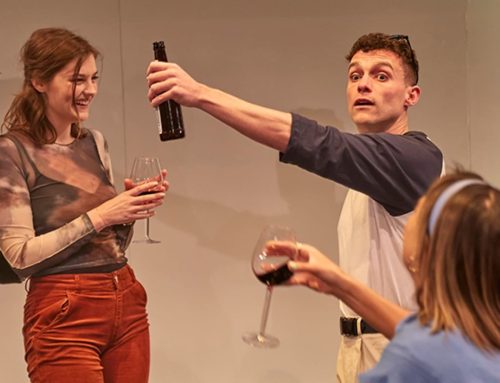Sally Rogers’ highly watchable debut comedy has some great lines and gets the early 80s tone of seedy decay just right.
7 June 2022 – Press Night
Looking back, we can sometimes be tempted to perceive events in the past as having been more predictable than they actually were.
My memories of Britain in 1981 are of a country falling apart. Old values and certainties had been crushed by the recession induced by Thatcher’s early 80s monetarism. For many, particularly in the North, the zeitgeist was a feeling of beleaguered hopelessness (a topic addressed recently in the Almeida’s altogether less successful House of Shades).
The idea that Britain would move into the affluent, me-first, yuppiedom of the mid to late 80s might, looking back, seem like an historical inevitability. At this time, it certainly did not feel that way.
Where Sally Rogers’ debut play, The Still Room, works best is in capturing the sense of powerless experienced by so many in that troubled time.
In the unfolding story of a weary group of catering staff at a dingy Manchester hotel, she paints a vibrant and deeply empathetic picture of a generation dealing with sexual, cultural, and political upheavals they are unable to influence, or even understand.
Stuck in dead-end jobs of various degrees of monotony, the group’s thwarted aspirations are portrayed (to the opening and closing soundtrack of The Gap Band’s “Oops Upside Your Head”) with pitch perfect resolution.
Rogers also has a fantastic sense for the kind of vignettes that reveal unexpected sides to the characters she writes, and of whom she is so clearly fond. Her approach to comic dialogue is somewhere between the poignant but generous mockery of Victoria Wood’s dinner ladies and the acerbic unpredictability of Jo Orton.
For example, long-serving waitress Bernice, played with world-weary pathos in a show-stealing turn by Jane Slavin, tells of how she lost her virginity in Vauxhall Cresta behind the McVitie’s biscuit factory. “The sex,” we hear, “was forgettable, but the smell of the biscuits lingers on.” It is fantastic stuff.
Where the play works less well is in its two narrative arcs.
It is the day before Charles and Di’s 1981 wedding. Smart and sparky sixteen-year-old Janice is waiting tables while awaiting her ‘O’ level results. Exam success will offer her the opportunity of a better future than school-friend and dopey co-worker Karen is ever likely to achieve.
Sleezy bartender Dean did well in his ‘O’ Levels too, but never quite managed to move on. He is now stuck swapping tacky tales of sexual exploits with restaurant manager Kevin, who smells awful but has a heart of gold.
There is a lesson to Janice here if she would only just grasp it – do not get stuck in a dead-end job, because you might never leave.
Into the mix is thrown posh-girl Diane, who is earning some cash for her island-hopping holiday money, and whose middle-class future is pretty much assured by her hospital consultant dad.
Will Janice take inspiration from go-ahead Diane or is she destined to end-up like dead-end Dean? The resolution of this storyline seemed a little unconvincing to me. Partly this is because the character of Diane has, aside from being a metaphor for the uber-privileged Lady Di dropping in on working class despair, almost nothing to do.
The other narrative I found more problematic.
Janice is a virgin and comes up with the notion to sell her virginity to anyone inclined to take it. The price is two months’ rent of a London flat – she is aiming for Knightsbridge but would take Kentish Town. Meanwhile, real-life TV celebrity Stuart Hall (who was later to be revealed as a predatory paedophile) is in the next room, and it is Janice’s job to serve him.
I suppose Rogers’ aim was to show how a generation, deprived of opportunity, sold themselves cheap. Sex, or more specifically the value attached to virginity, both to predators like Hall and those willing to sell it, is an important topic (although not obviously subject matter for a comedy).
The narrative thankfully does not go where it might have, but even so, something about this storyline felt a little off. I am guessing the writer struggled here too – because Janice’s final cri de cœur, in which she denounces Hall’s sexual predations, seemed like a hasty, defensive, post-hoc ad-on.
Great performances all round, with Chris Simmons’ oleaginous turn as the smelly Kevin deserving of a special mention. Overall, highly-recommend for the comic dialogue alone.
Writer Sally Rogers
Director Nigel Douglas
DIANE I ZOE BROUGH
DEAN I JACK COLGRAVE HIRST
JANICE I KATE JAMES
BERNICE I JANE SLAVIN
KEVIN I CHRIS SIMMONS
KAREN I LARNER WALLACE-TAYLOR
Duration: 2 hours. One interval.
Full Disclosure: I paid full box-office price for the ticket.
More Recent Reviews
Milked. White Bear Theatre.
Written in 2013 and first seen a decade ago in a production at the Soho Theatre, Simon Longman’s slice [...]
Fresh Mountain Air. Drayton Arms Theatre.
Lana Del Rey’s ode to female unity and resilience, God Bless America And All the Beautiful Women In It, [...]
Rodney Black: Who Cares? It’s Working. Lion and Unicorn Theatre.
Rodney Black is a tacky small-time comedian with a venal manager and a taste for nasty misogynism. “I’m a [...]





